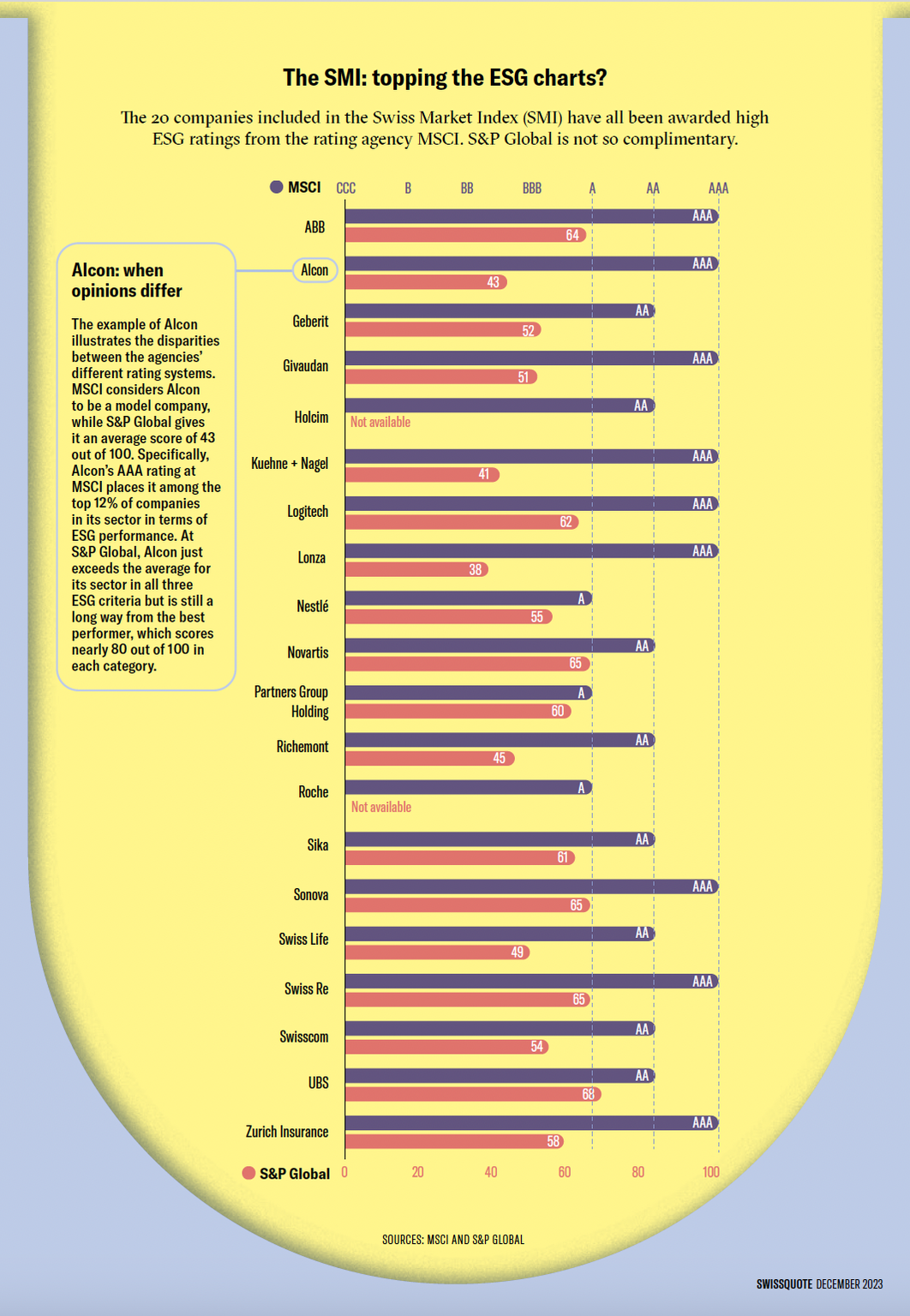
ESG: the mish-mash criteria
In terms of environmental, social and governance criteria, the ratings awarded by rating agencies are still difficult for private investors to use. We take a closer look...
By BERTRAND BEAUTÉ
ESG. Those three little letters stand for an essential tool now used throughout the finance world. "All major listed companies now understand that they can’t get around environmental, social and governance (ESG) criteria," says Franck Sabbah, head of AM Sales Continental Europe at Berenberg. "If they don’t have an ESG policy, they are closing themselves off to sources of financing."
To stay in the loop, most listed companies now publish lengthy "sustainability reports" alongside their traditional financial reports to inform investors of their non-financial risks relating to climate, ethics and governance issues. "These days, an ESG report is about 80 pages minimum. That amounts to a lot of work for companies," Franck Sabbah adds. "While large companies can pour substantial resources into implementing their ESG policy, small caps sometimes struggle. We have to assist them in highlighting their ESG approach, but small companies still have trouble meeting all the reporting requirements."
As an example, the Berenberg manager cites the Italian company Carel, a leader in air conditioning and refrigeration control systems. Between 2021 and 2023, its ESG rating from MSCI has risen from B to AA. "Carel’s business model hasn’t fundamentally changed," Franck Sabbah says. "Its rating increased mainly because in 2021, the company was able to demonstrate that its technology reduces its customers’ emissions."
"ESG rating systems are opaque"
Laura Kaliszewski, global head of Client Sustainable Investing at Natixis Investment Managers
Based on the sustainability reports provided by companies, rating agencies such as MSCI, Moody’s ESG, S&P Global, Refinitiv and Morningstar (the list is not exhaustive, as more than a hundred exist worldwide) assign an ESG rating to each firm. No report means no rating, or worse, a poor rating. The problem is that the agencies rarely reach consensus. A scientific paper published in the Review of Finance in November 2022 shows that ratings fluctuate enormously depending on the agencies considered.
"ESG rating systems are opaque" says Lsays Laura Kaliszewski, global head of Client Sustainable Investing at Natixis Investment Managers. "At Natixis IM, we prefer to use raw company data to determine our own ratings, which our affiliates can explain transparently to investors." That makes it difficult for a private investor to form an idea of a company’s "sustainability" based on its ESG rating, as the score may differ depending on the agency that awarded it.
This problem is compounded by the fact that although there are international standards such as those of the Global Reporting Initiative (GRI), they remain voluntary. Certain companies publish their own data, so it is complicated to compare them with other companies. "For investors, as well as for fund managers, standardising regulations would make things much simpler," says Yili Wu, sustainable investing strategist at Global X ETFs. "But I don’t think this is likely to happen, especially due to the divergence of interests and needs between the US and Europe."
Private investors may also find it unsettling that heavy polluters can end up with good ESG ratings. That is because the "E" for environment is only one of the three pillars of ESG. A highly polluting company can therefore partly offset a poor environmental rating with a strong social and/or governance rating. For example, MSCI awarded a BBB rating to Glencore, an A to McDonald’s, AA to TotalEnergies and the highest possible rating (AAA) on a scale from CCC to AAA to Coca-Cola.
"It may seem surprising that large polluting companies score well on certain ESG criteria from data providers," Laura Kaliszewski says. "Investors need to dissect this data and not blindly track ESG scores without understanding and challenging them. But let’s also note that when these same companies take climate action, their impact on the world is technically much greater."
To improve reliability and facilitate comparison between companies, the European Union has decided to tighten the game rules with the Corporate Sustainability Reporting Directive (CSRD), set to go into effect on 1 January 2024. Going forward, companies will be required to provide more complete and detailed information on their material ESG risks, opportunities and impacts, based on 12 specific points known as the European Sustainability Reporting Standards (ESRS). All companies will therefore have to speak the same language, which will make it easier to compare the data provided and avoid any fragmented or biased communication. In addition, the data provided will have to be audited by professionals such as PwC, KPMG, Deloitte and EY, which usually certify the financial statements.
"With the CSRD, European companies will have to disclose their data, and it will be audited," Laura Kaliszewski says. "That’s a real change. But the directive will not solve all the problems." For now, the CSRD only applies to EU-based companies. But the directive introduces measures for those outside the EU. As of 2028, all companies with significant activity in Europe will have to comply with its requirements. The financial data firm Refinitiv estimates that the CSRD will affect nearly 10,000 companies outside the EU, and almost a third of them are based in the US. If the required information is not disclosed, the companies will be fined a percentage of their annual revenue generated in the EU. And Uncle Sam is not happy about it. In June, US Senator Tim Scott and Kentucky Congressman James Comer reacted, "Shifting to an EU-style climate regulatory regime in the US would materially and unnecessarily harm our nation’s oil and gas sector, agriculture sector, and our preeminent capital markets." The two Republicans called on the US Treasury to do everything in its power to block the CSRD.
"Europe is at the forefront of sustainability," says Tzoulianna Leventi, investment manager and ESG analyst at abrdn. "But it’s very complicated for investors because regulations change very quickly in this area, and the game rules are not the same worldwide. For these reasons, I think it’s hard to imagine any standardisation for now."

